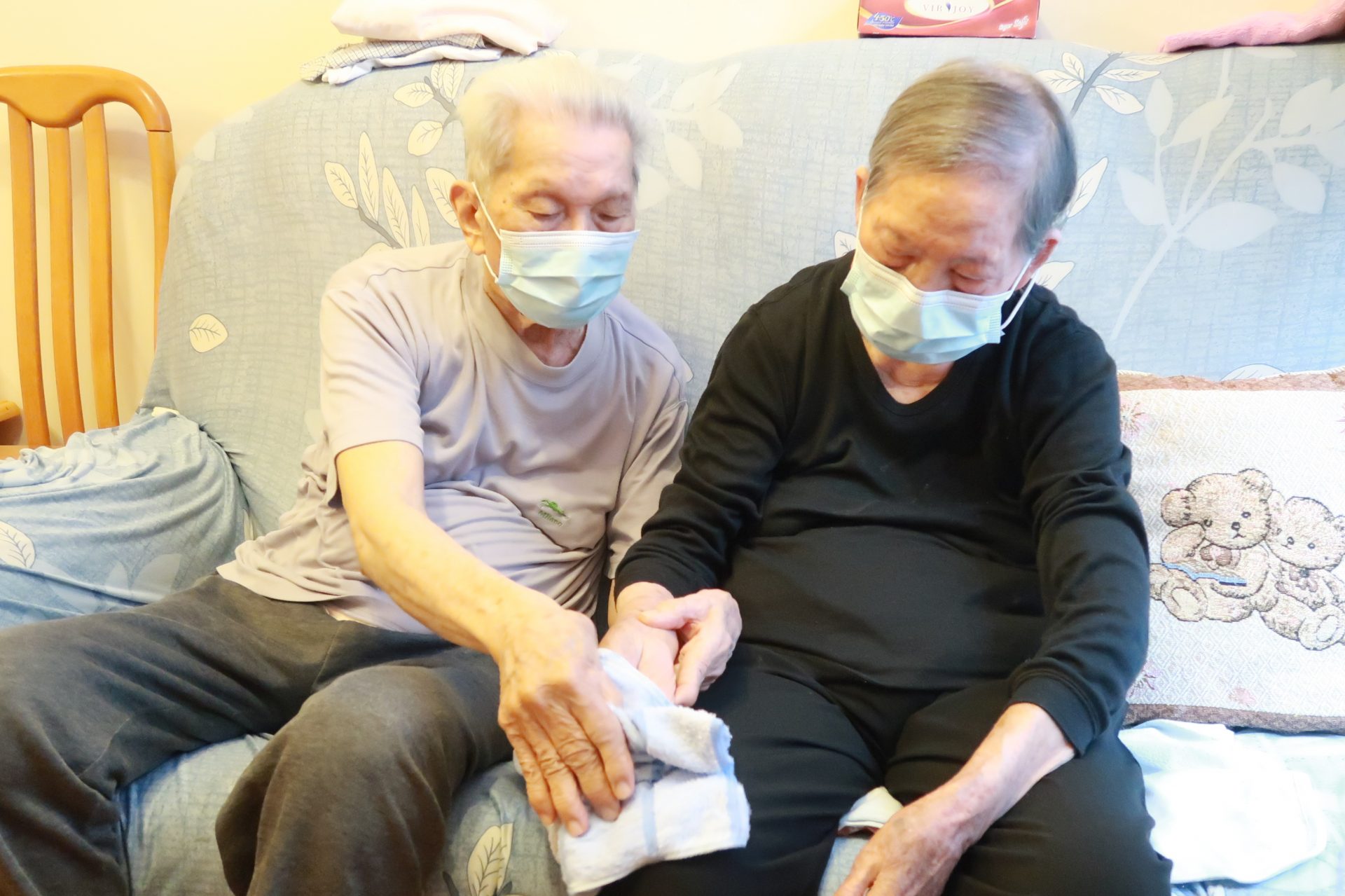Story
In Sickness and In Health – The Salvation Army Hoi Lam Centre for Senior Citizens
“When I was healthier, I used to travel around and take photos with my wife. Our life used to be breezy, but it began to change around 2002…” Mr. Lee shared. Auntie Chan was diagnosed with Parkinson’s disease. Her cognitive functions were declining, affecting her self-care abilities. She required intensive care which made Mr. Lee, her husband, feel very helpless. Though the couple has three daughters, they either live overseas or suffer from chronic illness themselves so they couldn’t help caring for Auntie Chan. The responsibility of taking care of Auntie Chan thus fell on Mr. Lee’s shoulders.
Mr. Lee himself is also suffering from chronic illness. He has to visit the doctor regularly. The work of caring for his wife made him stressed and exhausted. His knees hurt constantly, and he couldn’t sleep well. His health was also deteriorating! “Two years ago, my wife was not well and had pressure ulcers that had to be treated intensively, among other daily nursing care needs. I felt so helpless. I was not familiar with the resources of community services. Her pressure ulcers remained more or less the same even after a lot of treatments and I didn’t know how to balance her physical and emotional needs. Taking care of her gave me so much pressure!” Mr. Lee shared.
At the time, our Centre for Senior Citizens and other community service units in the area came together to offer help. In order to meet the needs of different patients, helpers would provide rehab equipment for patients’ households and come up with a wide range of nursing care plans for different stages of their recovery. These plans might include services of Neighbourhood Elderly Centres, day care and rehab services of Day Care Centres for the Elderly, transitional care services of Care and Attention Homes for the Elderly, escort services of Integrated Home Care units, and wound treatments by community nurses. All the assistance eased Mr. Lee’s pressure in the caregiving process. He could choose the appropriate services to care for Auntie Chan.
In the process, Ada, the social worker responsible for Auntie Chan’s case, spent a lot of time accompanying the couple and analyzed different nursing care plans for them, helping Mr. Lee to come to terms with how his wife’s health is deteriorating. At first, Mr. Lee couldn’t accept and cope with the slow and unpredictable recovery of Auntie Chan’s pressure ulcers and how her risk of falling was thus increased. He insisted that he could care for Auntie Chan at home himself. Sometime later, when he saw that Auntie Chan’s pressure ulcers were getting worse, he became anxious and desperate.
Ada and the other medical staff wasted no time and grasped Auntie Chan’s Golden Hours of treatment to explain to Mr. Lee why pressure ulcers should be treated immediately and how they might cause other complications. At the time, Mr. Lee felt torn and distressed, because he had to make crucial decisions on his own and he did not know how to pick the appropriate nursing care services for his wife. He also had trouble explaining Auntie Chan’s situation to his family one by one.
As the interdisciplinary team of Ada, medical staff, physiotherapists, and others came together, they took the time to talk to Mr. Lee and analyzed the situation for him. Mr. Lee began to understand his wife’s needs. He was used to tackling responsibilities hands-on, but he was indeed helpless when Auntie Chan required intensive care because of her pressure ulcers. Our Centre for Senior Citizens accompanied Mr. Lee in these difficult times and kept in contact with the couple’s daughters. Their family had a better understanding of their two elders’ circumstances now. They realised that they need to plan ahead the nursing care arrangements for the elderly couple.
Finally, with the help of his daughters, Mr. Lee decided to hire a domestic helper to share the burden of caregiving. Since the helper joined their family, they have been getting along quite well. She cares for the two elder’s daily needs attentively, which is a great relief for Mr. Lee. He is now healthier and can care for Auntie Chan’s emotional needs as well.
Some timely changes in the role of caregivers could be a great relief for them. As the caregivers’ health improve, the people they care for could also receive better care and enjoy better living quality, truly fulfilling the goal of “Ageing in Place”. Mr. Lee is very satisfied with his current circumstances and is especially grateful for how different social service units reached out and provided assistance for him and his wife.










